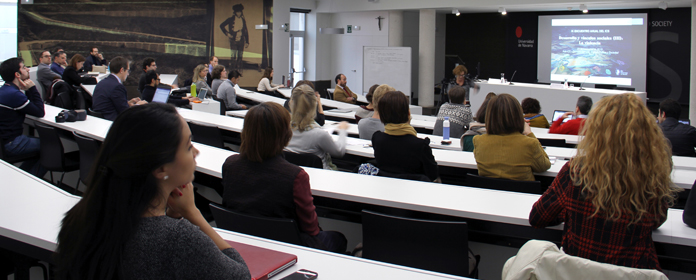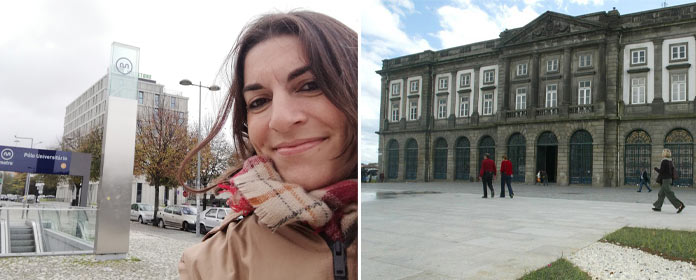Violence, topic convergent of the ICS projects in its IX Annual meeting
Papers were presented from the perspective of music, the teenage couple, interreligious conflicts, digital harassment of female political leaders and the relationship between income and violence in developing countries. development

PHOTO: Natalia Rouzaut
The 9th annual meeting of the Institute for Culture and Society (ICS) of the University of Navarra has revolved once again this year around development and social bonds, topic convergent of its projects research. This edition focused on violence. Papers were presented from the perspective of music, adolescent couples, interreligious relations, digital harassment of political leaders and the relationship between income and violence in countries in development. position The opening was given by Iciar Astiasarán, Vice President of research, and Jesús López Fidalgo, scientific co-director of the center.
The Vice President praised the purpose of this activity: to achieve an interdisciplinary discussion around an issue of relevance to society. Thus, she emphasized the need for the center's projects to concur around lines to focus efforts. "Becoming a reference in a field requires many years of work and avoiding dispersion," he emphasized.
"The topic of this edition, violence, is very timely. In the media we see every day very varied manifestations, such as the murder of women by their partners or verbal and physical attacks on people who think differently," he explained.
On the other hand, he made reference letter to Horizon Europe, the program framework of research and innovation of the EU for the period 2012-2027. He pointed out that it contemplates the financing of lines of research of a humanistic nature, through a area on inclusive and secure societies: democracy, cybersecurity, resilience, cultural heritage... "I see a great opportunity for the ICS," he said.
The presentations began with the discussion paper of Albert Recasens entitled 'The music for the truce of Nice (1538): an attempt of reconstruction from the motet Jubilate Deo by Cristóbal de Morales'. In it he presented the research that he is going to make in the project 'Creativity and Cultural Heritage' for the reconstruction of a motet commissioned to the composer Cristobal de Morales to commemorate the truce of Nice, signed between the emperor Charles V and the French king Francis I with the mediation of Pope Paul III. For this purpose, Recasens will analyze the historical and liturgical moment, as well as other works by the Sevillian composer.
Next, framework Demichelis, researcher of project 'Religion and Civil Society', presented her lecture entitled 'Religious identity or the lack of it. When human consciousness is framed by the Other's fear'. In it he presented some of the conclusions of his research developed thanks to a scholarship Marie Curie with some ideas from the book 'Holy ignorance, the time of religion without culture' by Olivier Roy. According to researcher, the loss of culture about religion is a cause of religious extremism. Demichelis states that ignorance coupled with the political use of religion has led to the manipulation of many citizens, as in the case of ISIS.
The second block of conferences began with presentation by Jaime Millán, researcher of the Navarra Center for International Development, who presented his research on violence, displacement and palm oil plantations in Colombia. The expert has found that when the price of palm oil increases, there are more displacements in the regions with plantations. For researcher this happens because small farmers flee from paramilitaries, who sell these lands to enrich themselves.
Afterwards, Eleonora Esposito, researcher at project 'Public discourse', gave a presentation on 'Digital Violence Against Women in Politics: New Era, Old Problem?' on research which she developed thanks to a scholarship Marie Curie. Esposito explained how the communication landscape has changed with social networks that allow everyone to have a voice, although this does not mean that there is equality. In particular, she referred to the online misogyny of women politicians. Eleonora criticized that it is common to see memes of female politicians degraded and turned into sexual objects.
Finally, Cristina López del Burgo and Gonzalo Arrondo, from the projects 'Education de la afectividad y de la sexualidad humana' and group 'Mente-cerebro' respectively, presented the joint discussion paper 'Impulsividad y violencia de pareja en adolescentes hispanohablantes' (Impulsivity and partner violence in Spanish-speaking adolescents). "In Spain, 9 out of 10 adolescents admit to having experienced psychological violence," lamented López del Burgo. Through the YourLife line, they surveyed 1,500 Spanish-speaking adolescents between 13 and 17 years of age to learn about their lifestyles. The questions included issues of intimate partner violence and ADHD. According to Arrondo, they found that people with ADHD traits of impulsivity and hyperactivity have a greater propensity to suffer and exercise intimate partner violence. Above all, there is a strong correlation between being a woman with ADHD traits and suffering sexual violence.




